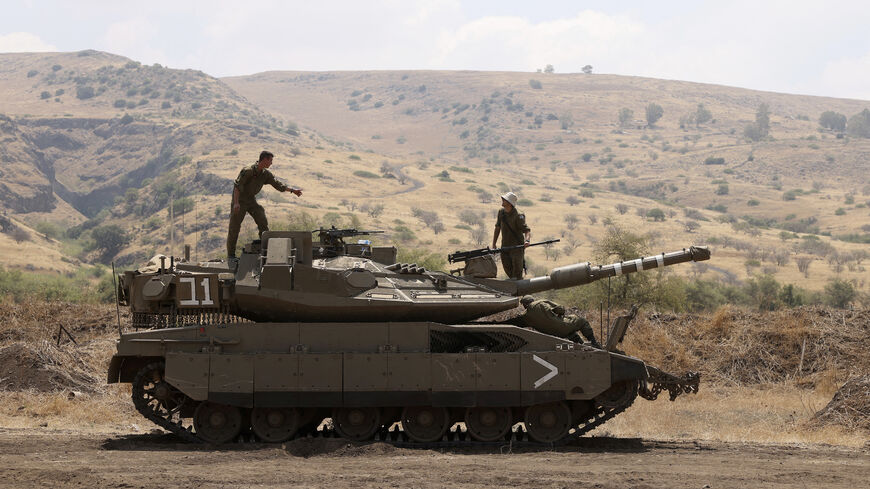TEL AVIV — The flood of warning by security tops over the damage caused by the government’s judicial overhaul plan to the readiness and capabilities of the Israel Defense Forces (IDF) could explain recent efforts by US Central Command (CENTCOM) and the American security leadership to deepen ties and cooperation with the Israeli army.
The US Fifth Fleet and elite Israeli naval commandos held a joint drill this week — codenamed “Juniper Spartan” —the latest in a series of exercises examining the interoperability of the two allied military forces. The exercise demonstrated a sharp paradox: even as relations between President Joe Biden and Prime Minister Benjamin Netanyahu deteriorate, the security relations between the armies are flourishing and deepening.
This week, in conjunction with the latest drill, CENTCOM head, Gen. Michael “Erik” Kurilla, visited Israel as the guest of Israel’s military chief, Lt. Gen. Herzi Halevi. Kurilla also met Wednesday with Defense Minister Yoav Gallant for their fifth meeting since Gallant took office seven months ago, which works out to an average of almost monthly meetings between the two.
Do these frequent meetings indicate a genuine deepening and strengthening of security ties between the sides even as Israel undergoes its greatest constitutional crisis ever, or deep American concern about the impact of the domestic upheavals on Israel’s military? The answer to this intriguing question is becoming increasingly clear.
The Juniper Spartan exercise was particularly interesting given the identity of the forces involved — Israel’s naval special operations force known as Shayetet 13, equivalent to the US Navy SEALs, and similar American forces (which were not specified in the official statement by the sides). A few weeks ago, Israel’s 7th Armored Brigade conducted a drill with an American armored unit. This week's exercise was described as intended to bolster "joint security in the maritime space," but tellingly, it was led by the Depth Command of the IDF, a multidisciplinary military unit established to deal with threats from the "third circle," in other words, Iran.
These and other joint exercises were planned well in advance as part of the two nations’ annual work plans. The IDF is also accustomed to periodic bouts of increased American interest in its operational plans. The most prominently displayed interest was registered in 2011-12, when Israel was reportedly preparing for an attack on Iran's nuclear infrastructure and some in Washington feared that Netanyahu and then-Defense Minister Ehud Barak might surprise the United States with an attack that would drag the latter into the fray.
These days, the thrust of the heightened US concern is different. For the first time ever, the Americans are expressing interest not only in the IDF's plans and voicing concerns about surprise and unnecessary military action, but also genuine worry about the IDF's condition and its readiness to meet the challenges it faces.
The worry stems from growing waves of protest among military reservists, who form the backbone of the IDF operational capability, against the government’s design to weaken the country’s courts. The judicial overhaul was launched Monday with Knesset approval of a bill neutering the Supreme Court’s authority to review government decisions. Hundreds of reserve pilots, on whom the Israel Air Force relies heavily for its combat and reconnaissance missions, have announced or intend to announce that they will stop volunteering for reserve service to protest what they fear is Israel’s slide into a dictatorship.
The protest is also being felt in other units, and for the first time has permeated the career army, as well. In recent weeks, the IDF's Intelligence Directorate has sent four documents to Netanyahu warning of the judicial overhaul’s threat both to the IDF's operational capability and to Israel's eroding deterrence capacity.
Netanyahu seems to have ignored the warnings, as did most members of his security Cabinet. On Monday, hours before the decisive Knesset vote, Military Intelligence head Maj. Gen. Aharon Haliva and head of the IDF’s Operations Directorate Maj. Gen. Oded Basiuk were dispatched to brief government ministers on the emerging security risks. They came to the Knesset, were placed in a side room and hoped that the ministers would show up to hear firsthand assessments by the military’s top brass. But only two showed up — former Shin Bet security agency director and current Agriculture Minister Avi Dichter and Intelligence Minister Gila Gamliel, both of Netanyahu’s Likud party.
Such complete disregard by the entire political echelon of serious military concerns is unprecedented in Israel, where security considerations are paramount. Netanyahu himself refused to meet Halevi before Monday’s vote, probably to provide himself with a level of future deniability regarding his awareness of the legislation’s danger. The meeting between them took place only after the unanimous passage of the law.
"The Americans are very concerned about what is happening in Israel," a senior Israeli security source told Al-Monitor on condition of anonymity. "Although relations between President Joe Biden and Prime Minister Benjamin Netanyahu are shaky, although no date or location has yet been set for a meeting between them, they look at the overall disintegration of Israeli statehood, and especially at the damage to the IDF and to the principle of the 'people's army' with great concern. We must not forget that Israel and the United States are still very close allies. Israel was called for years 'the longest US aircraft carrier in the Middle East,' and as soon as something in the core of this aircraft carrier's reactor goes wrong, it becomes a US headache.”
That is why the joint exercises between Israel and the United States continue and are even intensifying, and US hints about devising a military option against the Iranian nuclear program also pop up from time to time, at Israel's demand.
The Institute for National Security Studies, a leading Israeli think tank, conducted a war game exercise in recent months in front of an American audience of security and military officials simulating a military confrontation between Israel and Iran. One of the options played out was a US-Israeli confrontation with Iran resulting from a series of unexpected events and miscalculations prompting Iran to resume enrichment of military-grade uranium, followed by an expected Israeli response and a rapid deterioration into a military clash.
The current American goal is simple. "On the one hand, they want to keep the Iranian genie in the bottle until after the presidential elections," a senior Israeli political source told Al-Monitor on condition of anonymity, “but also to limit and anesthetize it on the other. After the 2024 elections? All bets are off."








